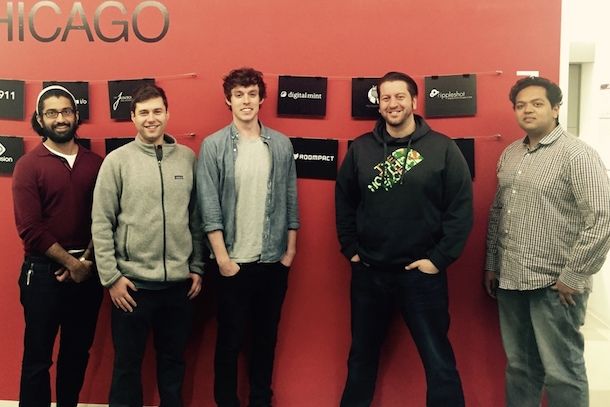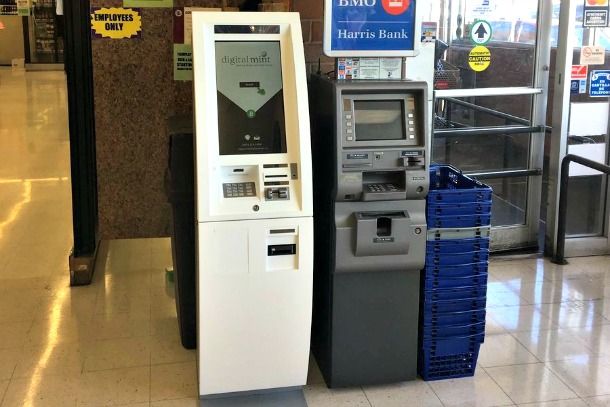
Although far from ubiquitous, bitcoin ATMs are a lot more common these days than they used to be. BLUE1647 has one, as do a number of currency exchanges and convenience stores across the city. One bitcoin ATM is even located inside a Chicago brewery taproom.
Considering the cryptocurrency’s high-tech backbone, the idea of going to a physical location to exchange pieces of paper for bitcoins may feel strangely anachronistic. But, as it turns out, there are good reasons why hard cash is still part of the bitcoin ecosystem.
“Once I send bitcoin to somebody, I have no way of getting it back,” said Jonathan Solomon, co-founder and CEO of Chicago bitcoin startup Digital Mint. “It’s the same as putting $100 in an envelope and dropping it into a blue mailbox.”
Most forms of digital transactions, like credit card payments and bank transfers, can be disputed after the fact — which is bad news if you've already handed over a bitcoin. To protect themselves, many vendors put strict limits on transaction sizes, or put transactions on hold until they've cleared through the bank.
By completing transactions in cash, bitcoin ATMs can deliver a customer's bitcoins immediately. Solomon and co-founder Marc Grens say the instantaneous transaction is one of their company’s biggest selling points.

Founded in 2014, Digital Mint was born out of a hobby project. Solomon moved to Chicago in 2013 and started attending bitcoin meetups that he described as “10 characters meeting in a mall food court.” It didn’t take long, however, until the Chicago bitcoin scene started taking off.
“We held a meetup where you could actually buy things with bitcoin,” said Solomon. “I think that was sort of a catalytic event, because you could go to this bar and buy pizza and beer with an app that I developed.”
The Chicago bitcoin scene has since exploded. Chicago hosted its first bitcoin conference in 2014, and held another the following year. 2015 was also the year Chicago’s first cryptocurrency incubator — Chicago Bitcoin Center, where Solomon serves as executive director — opened its doors inside 1871.
For Digital Mint’s co-founders, what started off as a hobby project of owning a bitcoin ATM or two soon turned into a full-fledged business. Today, the startup has nine full-time employees, operating 50 ATM and teller locations in nine states across the country. Some of the ATMs even let customers withdraw cash for their bitcoins.
“Our goal is to cover every inch of the United States, and then to expand overseas as much as we can,” said Grens.
Although they are open to branching into other cryptocurrencies, Digital Mint’s founders said they are currently focusing on bitcoin because it is the only digital currency that has gained real traction so far. Companies like Microsoft, Steam and Overstock.com already take bitcoin, and Uber switched to bitcoin-based payments in Argentina last summer after regulators blocked credit card companies from working with it inside the country.
Bitcoin has also come to take on a similar role in the cryptocurrency world to that of the U.S. Dollar in traditional markets.
“Bitcoin is viewed as the reserve currency for all other digital currencies, and many people buy bitcoin first in order to purchase other cryptocurrencies like Ethereum, Litecoin, and many others entering in the market,” said Grens.
Grens and Solomon said they’re excited to see the interest expressed by tech companies and traditional consulting firms like PricewaterhouseCoopers and KPMG around the currency. But payments are only one use case for bitcoin technology. In November 2016, the Cook County Recorder of Deeds announced its plans to study how it could use the currency’s underlying distributed ledger system to track property transfers.
The pair briefly considered getting into consulting to help businesses get a handle on bitcoin, but they eventually decided to keep their focus on growing Digital Mint instead.
“We’re growing, and we’re looking for talented marketing and business development people, as well as for technologists with Ruby on Rails experience,” said Grens. “It’s kind of open-ended. If we find somebody we like, we’ll grab them.”
Images via Digital Mint and Twitter.
What's your company's story? Let us know with a tip or a tweet @BuiltInChicago




